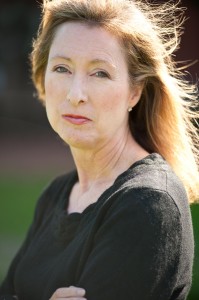 Deborah Scroggins is the author of Wanted Women: Faith, Lies and the War on Terror: The Lives of Ayaan Hirsi Ali and Aafia Siddiqui. (HarperCollins, January 17, 2012). Her first book, Emma's War (Pantheon, 2002), won the Ridenhour Prize for Truth-telling. A former editor and reporter for the Atlanta Journal-Constitution, she has also written for Vogue, Granta, the Nation, the NYT Sunday Magazine and many other publications. She lives in Massachusetts with her husband, the writer Colin Campbell, and their two daughters.
Deborah Scroggins is the author of Wanted Women: Faith, Lies and the War on Terror: The Lives of Ayaan Hirsi Ali and Aafia Siddiqui. (HarperCollins, January 17, 2012). Her first book, Emma's War (Pantheon, 2002), won the Ridenhour Prize for Truth-telling. A former editor and reporter for the Atlanta Journal-Constitution, she has also written for Vogue, Granta, the Nation, the NYT Sunday Magazine and many other publications. She lives in Massachusetts with her husband, the writer Colin Campbell, and their two daughters.
On your nightstand now:
Jennifer Egan's A Visit from the Goon Squad and Ali Soufan's The Black Banners.
Favorite book when you were a child:
The Little Princess by Frances Hodgson Burnett. I was laid up after a bicycle accident and I read it over and over again.
Your top five authors:
Leo Tolstoy, George Elliott, Nagib Mahfouz, Thomas Mann and Boris Pasternak. I love the great realists, the ones who show you a whole world in their books.
Book you've faked reading:
The Iliad. (It's my husband's favorite book, but I don't do epic poetry.)
Book you're an evangelist for:
The Looming Tower by Lawrence Wright. A masterpiece of nonfiction narrative and the best single book on 9/11.
Book you've bought for the cover:
The Persian Bride by James Buchan. That picture of a dainty foot on a Persian rug was the perfect enticement to dive into a exquisite love story as well as a fantastic introduction to Iranian history and culture.
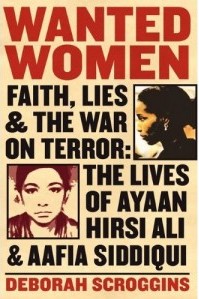 Book that changed your life:
Book that changed your life:
Marianne Alireza's At the Drop of a Veil: The True Story of a California Girl's Years in an Arabian Harem. Thirty-odd years after I first read this memoir, I'm still fascinated by the subject of women and Islam.
Favorite line from a book:
"The past is never dead. It's not even past." --Requiem for a Nun, William Faulkner
Book you most want to read again for the first time:
Gone with the Wind. My parents gave it to me at the age of 11 thinking it would keep me quiet on a flight to Europe. I was so enthralled that I missed half the vacation. The politics would probably spoil it for me if I tried to read it now, but I still remember how real Scarlett and Melanie felt to me then.
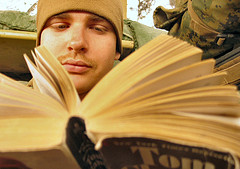 "Back when I was a reader, it often troubled me when friends claimed that they had no time to read. Was it possible that their lives were so full of wonders that they could not spend five minutes here or there to read? How was it that my life, in comparison, seemed to offer so many chunks of reading time throughout the day? A train ride, a late-night break, and an office wait. Through marriage, babies, graduate schools, and new jobs, I always found time to read for pleasure.... Alas, dear reader, the term 'pleasure' doesn't capture the mental and physical need for books I once had. Without a book nearby I felt bereft, purposeless, barely human.... Books can steady a chair and a soul. The former use is not recommended for Kindle."
"Back when I was a reader, it often troubled me when friends claimed that they had no time to read. Was it possible that their lives were so full of wonders that they could not spend five minutes here or there to read? How was it that my life, in comparison, seemed to offer so many chunks of reading time throughout the day? A train ride, a late-night break, and an office wait. Through marriage, babies, graduate schools, and new jobs, I always found time to read for pleasure.... Alas, dear reader, the term 'pleasure' doesn't capture the mental and physical need for books I once had. Without a book nearby I felt bereft, purposeless, barely human.... Books can steady a chair and a soul. The former use is not recommended for Kindle."











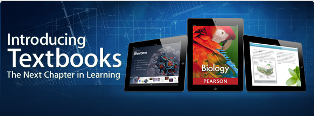 At Apple's much-anticipated launch event yesterday in New York City, the company took direct aim at the education market with its promise to "reinvent textbooks" through the introduction of three new or updated tools, including what Apple described as "an entirely new kind of textbook that's dynamic, engaging and truly interactive." The apps include:
At Apple's much-anticipated launch event yesterday in New York City, the company took direct aim at the education market with its promise to "reinvent textbooks" through the introduction of three new or updated tools, including what Apple described as "an entirely new kind of textbook that's dynamic, engaging and truly interactive." The apps include:
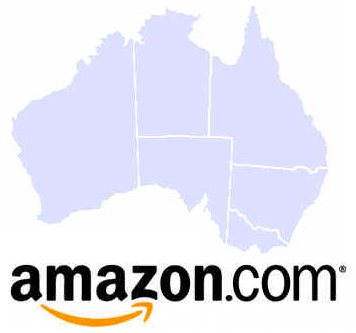 U.S. investment bank Morgan Stanley "is tipping" investors that Amazon, which is searching for a data center for its web services business in Australia, "could easily expand this presence into a full service offering
U.S. investment bank Morgan Stanley "is tipping" investors that Amazon, which is searching for a data center for its web services business in Australia, "could easily expand this presence into a full service offering  Seattle's KING 5 News reported that "growing friction" in the city's South Lake Union neighborhood due to the
Seattle's KING 5 News reported that "growing friction" in the city's South Lake Union neighborhood due to the 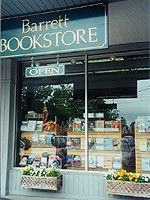 At
At 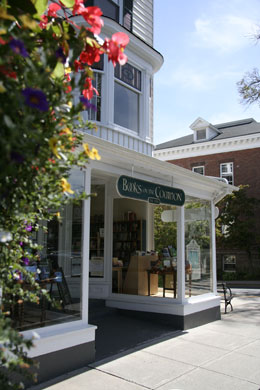 The community theme was echoed by Ellen Burns, owner of
The community theme was echoed by Ellen Burns, owner of 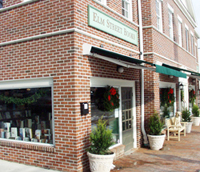 Kathleen Millard, owner of
Kathleen Millard, owner of 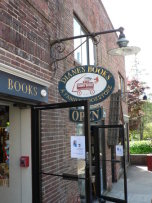 The success of
The success of  Books-A-Million
Books-A-Million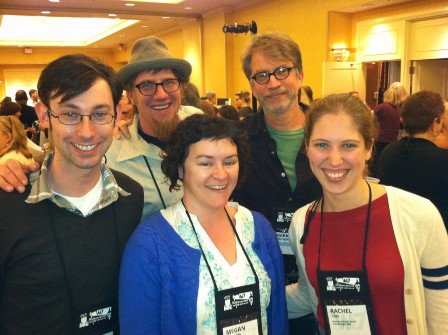
 Taking a break from Thursday's Winter Institute sessions, booksellers posed wearing their spiffy Shelf Awareness badgeholders: (back row, l. to r.) Kevin Hunsanger, Green Apple Books, San Francisco; and Mark Lamphier, Harvard Book Store, Cambridge, Mass.; (front, l. to r.) Stefan Moorehead, Unabridged Books, Chicago; Megan Sullivan and Rachel Cass, Harvard Book Store.
Taking a break from Thursday's Winter Institute sessions, booksellers posed wearing their spiffy Shelf Awareness badgeholders: (back row, l. to r.) Kevin Hunsanger, Green Apple Books, San Francisco; and Mark Lamphier, Harvard Book Store, Cambridge, Mass.; (front, l. to r.) Stefan Moorehead, Unabridged Books, Chicago; Megan Sullivan and Rachel Cass, Harvard Book Store.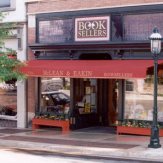 Forbes magazine showcased "
Forbes magazine showcased " The Sundance Film Festival opened yesterday in Park City, Utah, and will run through January 29. Word & Film noted that the legendary setting "has become a bit of
The Sundance Film Festival opened yesterday in Park City, Utah, and will run through January 29. Word & Film noted that the legendary setting "has become a bit of  Deborah Scroggins
Deborah Scroggins Book that changed your life:
Book that changed your life: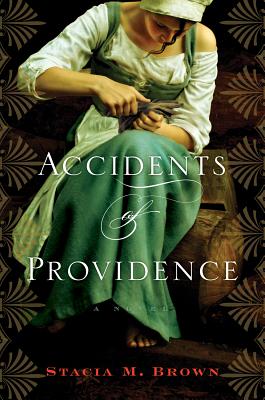 In a luminous and sensitive debut, Stacia M. Brown brings to life a love affair, a mystery and a murder trial, all set against the turbulent backdrop of Oliver Cromwell's England. It's 1649, shortly after Cromwell's army has seized control of the country and beheaded King Charles I. The realm is now under Puritan law, including one that states that any woman who secretly gives birth to an illegitimate child will be charged with murder and executed should the child be found dead. When glove-maker Rachel Lockyer's employer spies Rachel burying a dead newborn, she assumes the worst and reports Rachel to the authorities. So begins the unraveling of Rachel's mysterious past and the tale of her uncertain future.
In a luminous and sensitive debut, Stacia M. Brown brings to life a love affair, a mystery and a murder trial, all set against the turbulent backdrop of Oliver Cromwell's England. It's 1649, shortly after Cromwell's army has seized control of the country and beheaded King Charles I. The realm is now under Puritan law, including one that states that any woman who secretly gives birth to an illegitimate child will be charged with murder and executed should the child be found dead. When glove-maker Rachel Lockyer's employer spies Rachel burying a dead newborn, she assumes the worst and reports Rachel to the authorities. So begins the unraveling of Rachel's mysterious past and the tale of her uncertain future.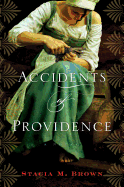
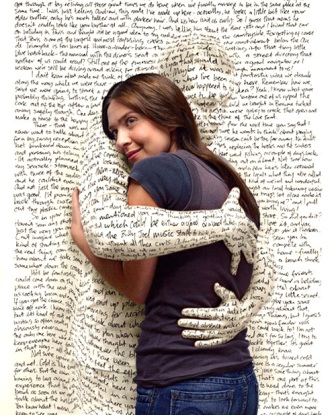 I mean... No. My interest in the books-as-friends conundrum was actually prompted by a couple of factors, one being Rick Gekoski's piece in the Guardian earlier this week under the provocative headline "
I mean... No. My interest in the books-as-friends conundrum was actually prompted by a couple of factors, one being Rick Gekoski's piece in the Guardian earlier this week under the provocative headline "